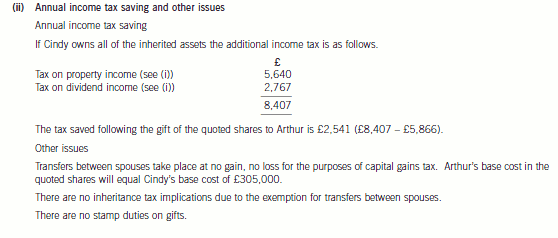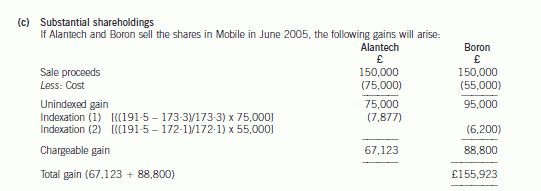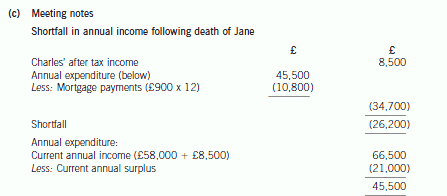(ii) Advise Mr Fencer of the income tax implications of the proposed financing arrangements. (2 marks)
第1题:
(b) (i) Advise Alasdair of the tax implications and relative financial risks attached to the following property
investments:
(1) buy to let residential property;
(2) commercial property; and
(3) shares in a property investment company/unit trust. (9 marks)
第2题:
(ii) Explain the income tax (IT), national insurance (NIC) and capital gains tax (CGT) implications arising on
the grant to and exercise by an employee of an option to buy shares in an unapproved share option
scheme and on the subsequent sale of these shares. State clearly how these would apply in Henry’s
case. (8 marks)
第3题:
(c) (i) State the date by which Thai Curry Ltd’s self-assessment corporation tax return for the year ended
30 September 2005 should be submitted, and advise the company of the penalties that will be due if
the return is not submitted until 31 May 2007. (3 marks)
(ii) State the date by which Thai Curry Ltd’s corporation tax liability for the year ended 30 September 2005
should be paid, and advise the company of the interest that will be due if the liability is not paid until
31 May 2007. (3 marks)
(c) Self-assessment tax return
(1) Thai Curry Ltd’s self-assessment corporation tax return for the year ended 30 September 2005 must be submitted by
30 September 2006.
(2) If the company does not submit its self-assessment tax return until 31 May 2007, then there will be an automatic fixed
penalty of £200 since the return is more than three months late.
(3) There will also be an additional corporation tax related penalty of £4,415 (44,150 × 10%) being 10% of the tax unpaid,
since the self-assessment tax return is more than six months late.
Corporation tax liability
(1) Thai Curry Ltd’s corporation tax liability for the year ended 30 September 2005 must be paid by 1 July 2006.
(2) If the company does not pay its corporation tax until 31 May 2007, then interest of £3,035 (44,150 at 7·5% = 3,311
× 11/12) will be charged by HM Revenue & Customs for the period 1 July 2006 to 31 May 2007.
第4题:
(ii) Compute the annual income tax saving from your recommendation in (i) above as compared with the
situation where Cindy retains both the property and the shares. Identify any other tax implications
arising from your recommendation. Your answer should consider all relevant taxes. (3 marks)

第5题:
(ii) List the additional information required in order to calculate the employment income benefit in respect
of the provision of the furnished flat for 2007/08 and advise Benny of the potential income tax
implications of requesting a more centrally located flat in accordance with the company’s offer.
(4 marks)
第6题:
(c) Advise Alan on the proposed disposal of the shares in Mobile Ltd. Your answer should include calculations
of the potential capital gain, and explain any options available to Alan to reduce this tax liability. (7 marks)

However, an exemption from corporation tax exists for any gain arising when a trading company (or member of a trading
group) sells the whole or any part of a substantial shareholding in another trading company.
A substantial shareholding is one where the investing company holds 10% of the ordinary share capital and is beneficially
entitled to at least 10% of the
(i) profits available for distribution to equity holders and
(ii) assets of the company available for distribution to equity holders on a winding up.
In meeting the 10% test, shares owned by a chargeable gains group may be amalgamated. The 10% test must have been
met for a continuous 12 month period during the 2 years preceding the disposal.
The companies making the disposals must have been trading companies (or members of a trading group) throughout the
12 month period, as well as at the date of disposal. In addition, they must also be trading companies (or members of a trading
group) immediately after the disposal.
The exemption is given automatically, and acts to deny losses as well as eliminate gains.
While Alantech Ltd has owned its holding in Mobile Ltd for 33 months, its ownership of the Boron holding has only lasted
for 10 months (at 1 June 2005) since Boron was acquired on 1 July 2004. Selling the shares in June 2005 will fail the
12 month test, and the gain will become chargeable.
It would be better for the companies to wait for a further month until July 2005 before selling the amalgamated shareholding.
By doing so, they will both be able to take advantage of the substantial shareholdings relief, thereby saving tax of £29,625
assuming a corporation tax rate of 19%.
第7题:
(b) (i) Advise Benny of the income tax implications of the grant and exercise of the share options in Summer
Glow plc on the assumption that the share price on 1 September 2007 and on the day he exercises the
options is £3·35 per share. Explain why the share option scheme is not free from risk by reference to
the rules of the scheme and the circumstances surrounding the company. (4 marks)
第8题:
(ii) Calculate her income tax (IT) and national insurance (NIC) payable for the year of assessment 2006/07.
(4 marks)

第9题:
(ii) Advise Benny of the amount of tax he could save by delaying the sale of the shares by 30 days. For the
purposes of this part, you may assume that the benefit in respect of the furnished flat is £11,800 per
year. (3 marks)

第10题:
(c) Prepare brief notes for the proposed meeting with Charles and Jane. Clearly identify the further information
you would need in order to advise them more fully and suggest appropriate personal financial planning
protection products, in respect of both death and serious illness. (9 marks)
You should assume that the income tax rates and allowances for the tax year 2005/06 and the corporation tax
rates for the financial year 2005 apply throughout this question.

When considering the shortfall
– The family’s expenditure is likely to increase as the children get older, particularly if there is a need for school fees.
– There will be a need for some cash immediately to pay for the cost of the funeral.
– It is assumed that the whole of Jane’s estate has been left to Charles such that there will be no inheritance tax on her
death.
– The shortfall may be reduced by:
(i) State benefits and tax credits.
(ii) Expenditure on non-essential items, e.g. holidays and entertainment included in the annual expenditure of
£45,500.
(iii) The income generated by Charles if he were to return to work.
– The shortfall may be increased by additional child-care costs due to Charles being a single parent, particularly if he
returns to work full-time.
Further information required
– The level of state benefits and tax credits available to Charles.
– The current level of expenditure on non-essential items.
– The costs of child-care if Charles were to return to work.
– Details of any wills made by Charles or Jane.
– Whether Charles’ investment properties could be sold and the proceeds invested in assets with a higher annual return.
– Whether there is any value in Speak Write Ltd independent of Jane, such that the company could be sold after Jane’s
death.
Other related issues
– The couple should consider making provision for their retirement via pension contributions or some other form. of long
term investment plan.
– The couple should recognise that there would be significant financial problems if Jane were to become seriously ill. In
addition to the family’s income falling as set out above, its expenditure would probably increase.
Protection products
– Term life assurance
A qualifying life policy would pay out a tax-free lump sum on Jane’s death.
– Permanent health insurance
Would provide a regular income if Jane were unable to work due to illness.
– Critical illness insurance
Would provide a capital sum in the event of Jane being diagnosed with an insured illness.